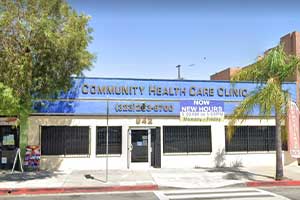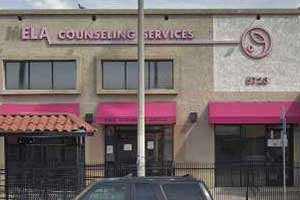Skip To Rehab Listing
Treatment Facility Settings and Recovery Approaches
Bell Gardens's numerous programs, a few of which are listed below, address an issue that is widespread in cities throughout the US: substance abuse. These centers combat this adversity locally by providing locations and services that are convenient for patients within the area. These settings can include: short term drug treatment, long term treatment programs, inpatient addiction treatment programs, outpatient detox facilities, outpatient substance abuse counseling.
Addiction treatment centers adopt many approaches, from long-established approaches to recently developed techniques such as: relapse prevention, trauma therapy, individual psychotherapy, brief intervention approach, rational emotive behavioral therapy, couple/family therapy. The result is an array of resources that clear the path to achievable sustained sobriety for numerous clients.
Special Programs for Addiction Offered by Treatment Centers
Those struggling with alcohol or drug addiction generally require personalized support to break free from addiction. That is why substance abuse treatment centers in Bell Gardens deliver specialized programs that help patients within their personal circumstances. Some of these resources are included here: self-help groups, veterans, social skills development, clients referred from the court/judicial system, residential beds for client's children, domestic violence.
Treatment Payment Options in Bell Gardens, California
Patients are faced with different economic situations, which is why substance abuse treatment centers offer multiple payment choices, including: private health insurance, private pay, military insurance, medicare, medicaid, county or local government funds, state corrections or juvenile justice funds.
Funding should never be a barrier to substance abuse recovery. Rehab centers direct patients toward the payment options that fit their individual economic concerns.
With a range of facilities, rehabs, services, methods and payment options, Bell Gardens offers patients several options when it comes to seeking treatment from addiction.
Commonly Asked Questions about Addiction and Treatment
What is the first step I must take to get sober?
The journey to sobriety begins with recognizing that there's a problem and deciding to make a change. Here are the steps you might consider:
Admitting the Problem: The first step towards getting sober is acknowledging that your substance use is causing problems in your life and that you need to make a change. This step can be challenging, as it requires honesty and self-reflection.
Seeking Help: Once you've recognized the problem, the next step is to reach out for help. This could involve talking to a trusted friend or family member, a healthcare provider, or a mental health professional. They can offer support and guidance as you navigate your next steps.
Assessment and Diagnosis: A healthcare professional, such as a doctor or a counselor specializing in addiction, can provide a comprehensive evaluation to understand the extent of your substance use and any co-occurring mental health conditions. This assessment will help guide your treatment plan.
Detoxification: If you're physically dependent on a substance, medically supervised detoxification may be necessary. This process manages the acute physical symptoms of withdrawal that occur when you stop taking the substance.
Treatment Plan: Based on your assessment, a personalized treatment plan will be created. This could involve a combination of individual counseling, group therapy, medication-assisted treatment, and supportive care. Treatment might be provided in various settings, including inpatient rehab, outpatient clinics, or through telehealth services.
Support Networks: Building a strong support network is crucial for maintaining sobriety. This could include sober friends and family, support groups like Alcoholics Anonymous or Narcotics Anonymous, and ongoing therapy or counseling.
Ongoing Recovery and Maintenance: Sobriety is a lifelong journey. Once you've completed a treatment program, it's important to have a plan in place to maintain your sobriety. This might involve ongoing therapy, regular attendance at support group meetings, and self-care practices to manage stress.
Remember, it's okay to ask for help, and it's never too late to start the journey to recovery. Everyone's path to sobriety is different, and what works best will depend on your individual circumstances, including the nature of your substance use, your personal history, and your support network.
Why do drug addicts blame everyone but themselves?
Drug addiction can significantly distort a person's thinking patterns and perceptions, leading them to behave in ways that are often self-protective and defensive. One of these behaviors can be a tendency to shift blame onto others. This occurs for a few reasons:
- Denial: One of the key psychological symptoms of addiction is denial. This is a defense mechanism that allows individuals to avoid confronting the reality of their addiction and its negative consequences. By blaming others, they deflect responsibility and maintain their state of denial.
- Avoiding Shame and Guilt: Addiction often carries a heavy burden of guilt and shame. Blaming others can be a way for individuals struggling with addiction to avoid these painful feelings and protect their self-image.
- Rationalizing Behavior: Blaming others can serve as a way for individuals to justify their drug use and associated behaviors. If they can convince themselves that their actions are a response to the actions of others, they may feel more justified in continuing their substance use.
- Fear of Consequences: Acknowledging personal responsibility could mean having to face significant consequences, including damage to relationships, legal issues, or the need for treatment. Blaming others allows the person to avoid these potential repercussions.
- Altered Brain Function: Drug abuse can lead to changes in the brain that impact judgment, decision making, learning, and behavior control, which might lead to a tendency to shift blame onto others.
Why are lgbtq+ individuals at higher risk for drug and alcohol abuse?
LGBTQ+ (lesbian, gay, bisexual, transgender, queer, and others) individuals are indeed at a higher risk for drug and alcohol abuse due to a variety of factors that often intersect and compound over time. These factors primarily relate to the stress and challenges associated with living as a marginalized group in many societies. Here are some of the main factors:
Minority Stress: This term refers to the chronic stress faced by individuals belonging to a stigmatized minority group. For LGBTQ+ individuals, this can stem from societal prejudice, discrimination, and violence related to their sexual orientation or gender identity. Such stressors can contribute to increased substance use as a coping mechanism.
Stigma and Discrimination: Experiences of rejection, exclusion, and maltreatment can increase feelings of anxiety and depression, which are associated with higher substance use rates. This can occur in various settings, including workplaces, schools, and even within families and social networks.
Internalized Negative Self-Perceptions: LGBTQ+ individuals may internalize societal biases and develop negative self-perceptions about their identity, leading to feelings of guilt, shame, and low self-esteem. These feelings can contribute to the misuse of substances as a form of self-medication.
Lack of Inclusive Healthcare: Many healthcare systems lack the resources or training to provide culturally competent care to LGBTQ+ individuals. This can make it difficult for these individuals to seek help or access effective treatment for substance use disorders.
Social Isolation: Feelings of isolation, which can be the result of rejection or non-acceptance by family, friends, or society, can increase the risk of substance use and misuse.
Intersectional Identity Stressors: LGBTQ+ individuals who also belong to other marginalized groups (like racial or ethnic minorities) may face additional stressors that can increase the risk of substance abuse.














